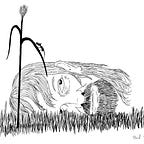The Power of Stories
What Is Your Story? — Chapter 3
We are a storytelling species. It’s how we make sense of the world. It’s how we share our experiences with each other, which is how we bond, stay together and evolve together. As far as our experience of reality is concerned, unless we can turn it into a story we can not really say we have experienced it in a meaningful way. If a tree falls in the woods it probably always makes a sound, even when there’s nobody there to hear it come down. But without a human being there to witness it, experience it and turn it into a tall tale to share about a giant crashing to the ground and the impression that made on the observer, the tree might as well have gone down in silence. The medium carrying the fall’s physical sound is the air, the medium carrying its metaphysical sound is the narrative — and as far as humans are concerned that metaphysical sound is all that matters.
Stories help us categorise and order reality to make it comprehensible and manageable for us. We use stories to assign significance to what would otherwise be random events. But stories are not static. They do not just describe and categorise their content: they bring their content to life by including movement and momentum. Our stories mimic our experiences by operating in time: they have a beginning, a middle and an end. Stories capture and inform the reality we experience by adding a sense of direction: an intentionality of movement that imbues our journey from beginning to end with a deeply felt significance.
To have any direction at all, stories must contain action; they must be about things happening and — to give it human significance — things being done either to make those things happen or in response to them happening. From a narrative perspective we are all much more living doings than living beings. We are much more a process than a thing. Our nature is defined by movement, transformation and progression: from birth to death, from food to tissues and energy, from desire to action, from fear to flight or fight, it’s the processes far more than the objects that form the essence of our lives.
When I describe myself, I can say something like:
I am a philosopher, writer, practitioner and teacher with a deep compassion for the human condition and a burning desire to help people live better lives.
But that is not a story, that’s a description. To make it a story it has to have a story-arc: a beginning, tension…
